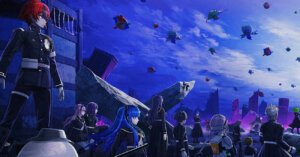Hey, hey, Zeke here! I’m back with another game from Japan. Like last time, we are visiting something recently. Machi Koro ( 街コロ: roughly, Dice Town) is a game that was originally published by a Japanese gaming company, Grounding, Inc., in 2012. The copyright date on my copy says 2015, so this game hasn’t been outside of Japan too long. The first page of the rule book describes it as “…the Japanese card game that is sweeping the world.” Now, I don’t know how far it’s made it, but having been translated into twelve languages and been given two expansions, it is certainly on its way.
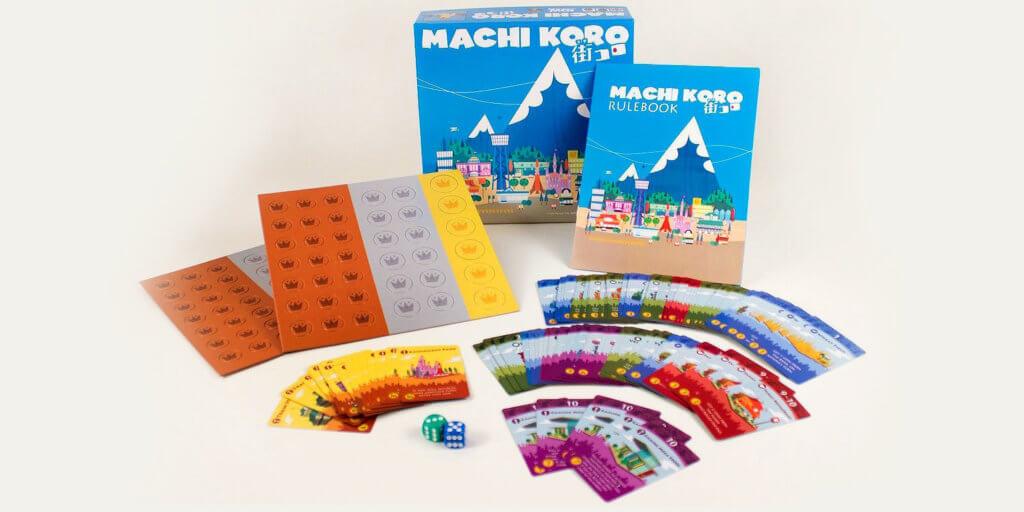
Of course, while you are trying your best to get your landmarks built, your neighboring towns are trying to finish theirs first! You build a farm, make a little money, then they acquire a forest! You can’t have them one-upping you, so you buy a mine. Then they build a cheese factory and hit it big. It’s a race to see who can complete the landmarks and capture the hearts of the populace!
Equipment
Being called “Dice Town” is quite accurate, as dice are the driving force in Machi Koro. The standard box comes with a pair of six-sided dice, one green and one blue (color doesn’t have any significance). You start off rolling one, but one of your landmarks allows you to roll a second one if you wish. Now, when I played with a group of four (the most players possible without an expansion), we grabbed a set of dice for each of us so we wouldn’t have to pass them around. I would recommend it if you have extra lying around (as I’m sure many of you do).
The next pieces of equipment are cards that represent the buildings in your town. The cards are split into two major categories: Landmarks and Establishments. The establishments are further broken into four more types: Primary Industry, Secondary Industry, Restaurants, and Major Establishment.
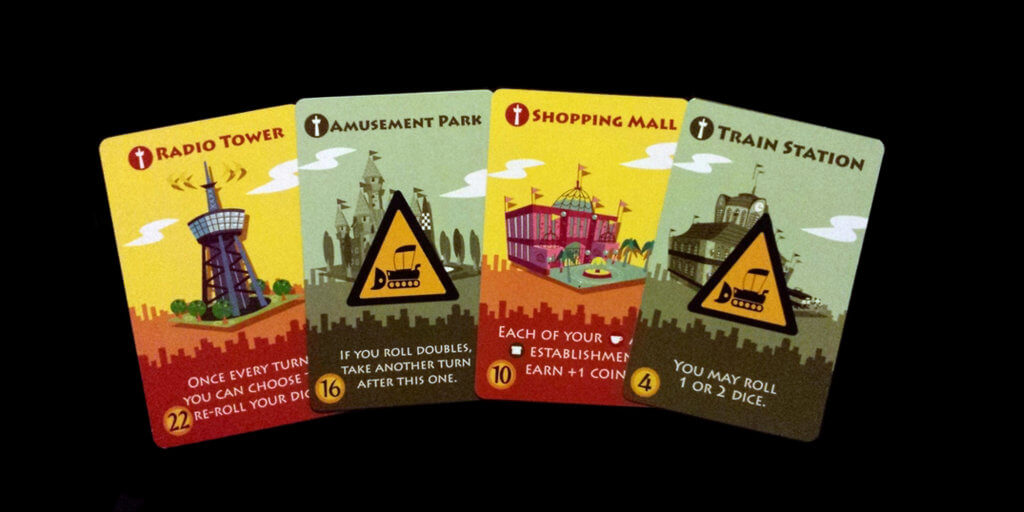
The Landmarks are your main goal in the game; complete all four and you are proclaimed the best mayor! Each one has a cost (the little number in the coin) to complete the project and a special ability available after you finish construction.
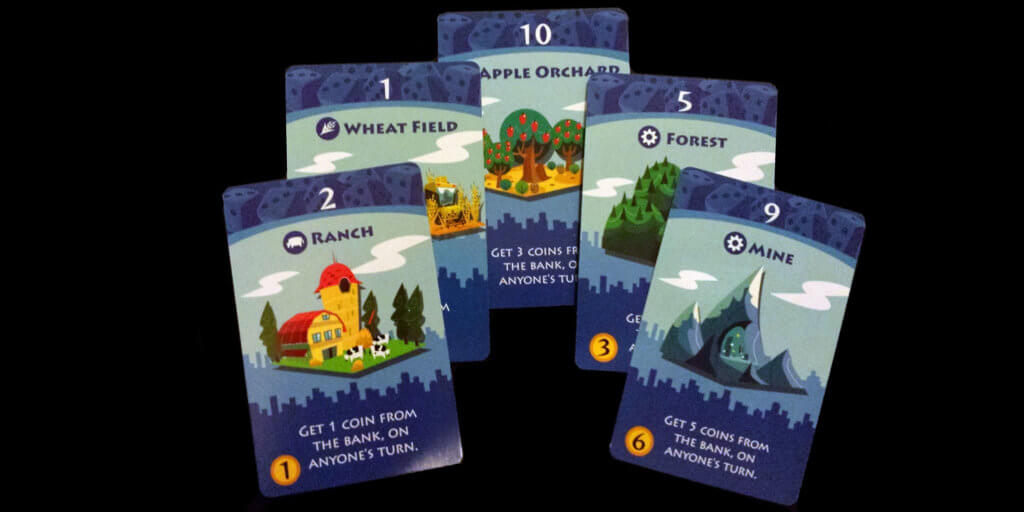
Primary Industry cards have a cost, an activation number (the dice roll required to activate the card), and a description of the cards’ effect. The card effect is a payout of coins from the bank, differing for each card. Primary Industries are activated whenever anyone rolls the activation number.
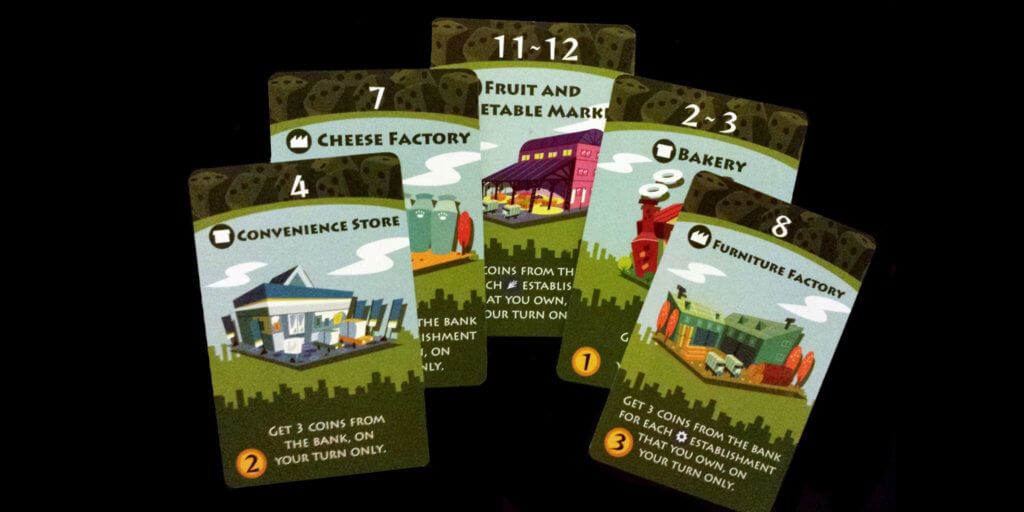
Secondary Industry cards are almost the same as Primary Industry cards, only they have a different colored card back and activate on your turn alone. There are several cards in this category that depend on Primary Industry cards to have full effect, so keep a look out for powerful combinations!
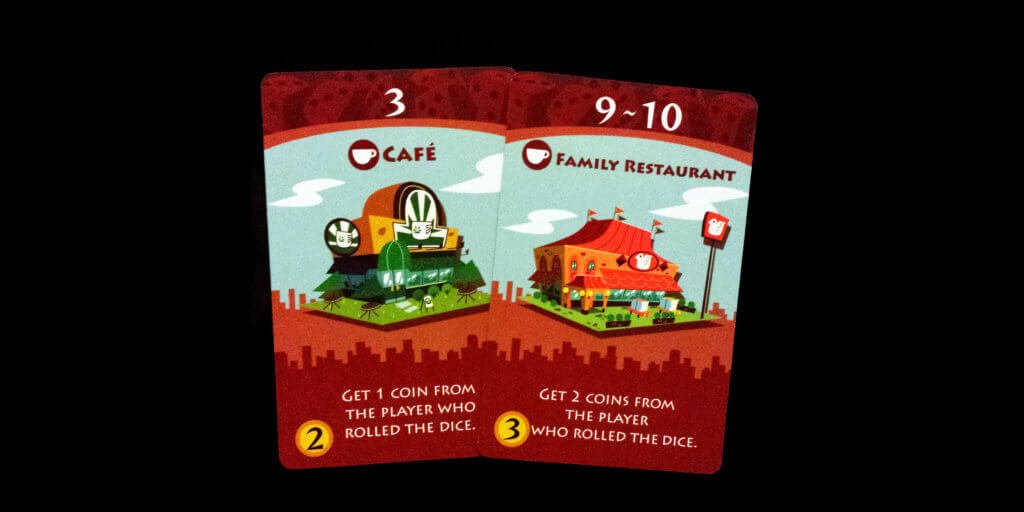
Restaurants differ from the Industry cards in a key way: the money they pay you is taken from the person who rolled the dice. This means they only pay on others’ turns, but you get to fill your pockets while emptying your opponents’!
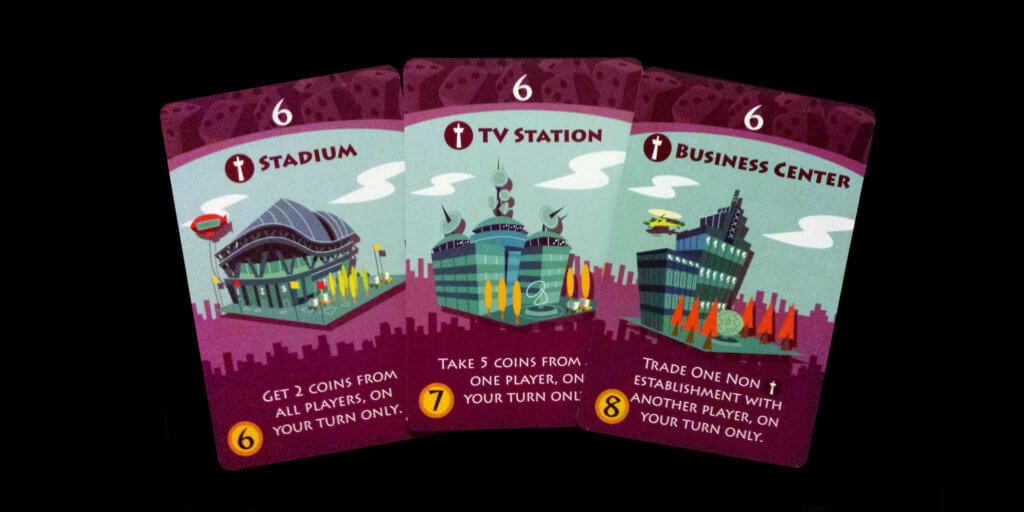
Major Establishments act differently as well; instead of having a simple payout, these have special effects ranging from taking coins from all players to trading your cards with another player’s! These powerful abilities only activate on your turn.
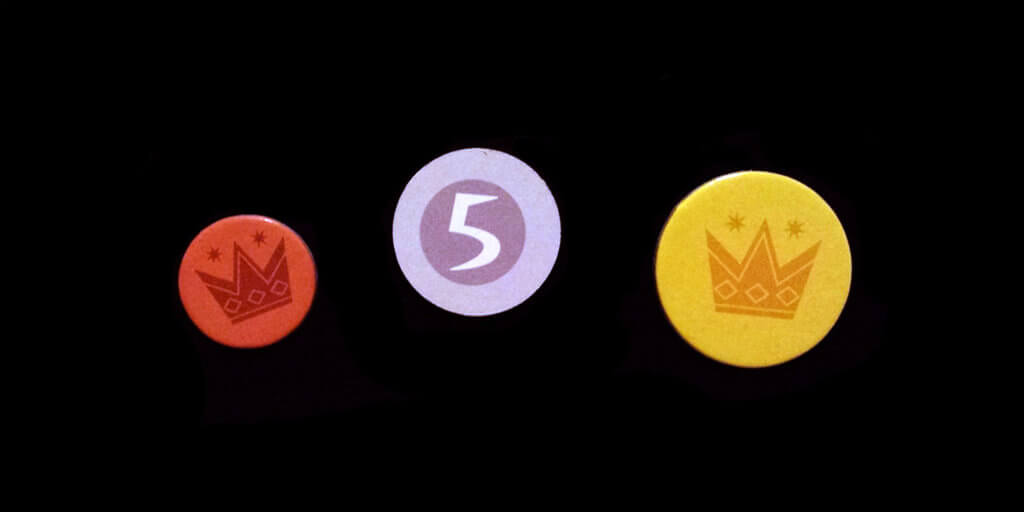
The final pieces of equipment for Machi Koro are coins. These little cardboard circles come in ones, fives, and tens.
Set up and Gameplay
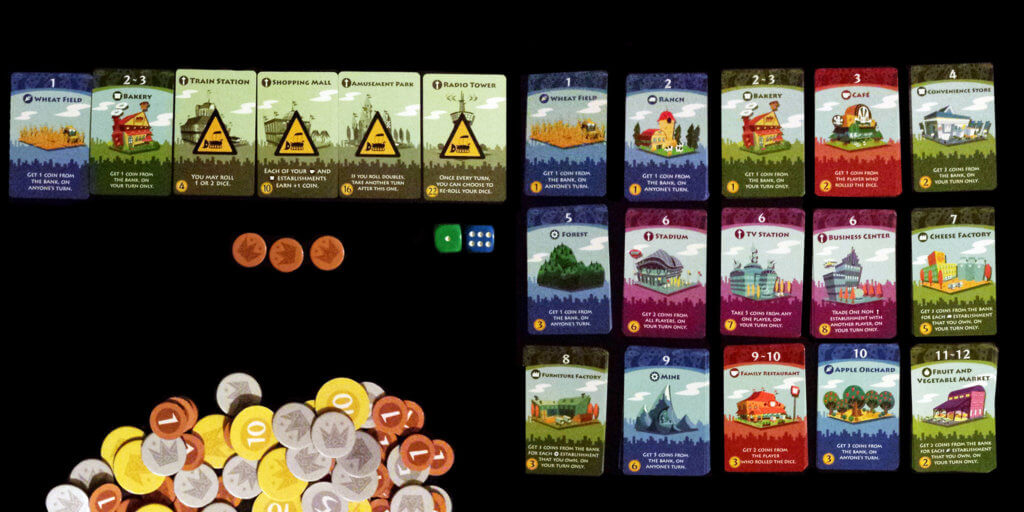
Set up is quite easy. Each player receives a stack of cards containing their starting establishments and landmarks. The starting establishments are distinguished from the rest by the lack of a cost and the different backside. The remaining establishments are laid out on the playing surface according to cost, starting with the Wheat Field. The cards are placed in three rows, five cards each. Then the dice are given to the starting player and play begins!
A player’s turn consists of three phases: rolling the die (or dice), earning income, and construction.
Dice rolling is easy enough, the player rolls a single die and notes the result. If the player has built the train station, they may roll two dice if they choose. If rolling two dice, the two results are always added.
The income phase may affect more than the current player. All appropriate cards activate when their activation number is rolled. This may mean your opponents earn money on your turn while you get nothing! If it were to come up, players are paid before you take money from the bank, meaning if you are broke, another player could get nothing from you and you still get to cash in on your own establishments.
Construction is where strategy comes into play in Machi Koro. You may spend any amount of money you have to purchase any one establishment or construct a landmark. Each card has a limited amount, so after they are gone, you can’t get more. Make sure you scoop up the ones you want and don’t let your rivals corner the market. Also, Major Establishments have such powerful effects that you are only allowed to purchase one of each.
Once a player has wrapped up their turn, the dice are passed to the next player in a clockwise order and play continues. Turns continue until someone has built all four landmarks. The person to complete this task first is declared the greatest mayor and the winner of Machi Koro!
Wrap up
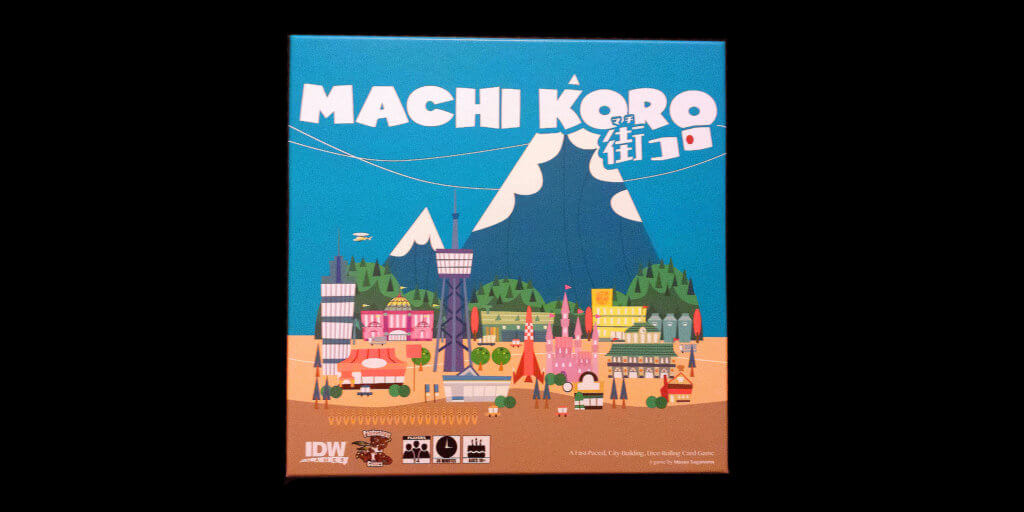
I admittedly bought this game without much research simply because it had a Japanese game designer, but I’m very happy I picked it up. I was quite pleased with the depth of play available in the game. The concept sounds simple, rolling dice and making money, but there are so many different paths to winning; playing the odds by covering all the numbers, gambling on one number for a big hit, combo-ing Primary and Secondary cards, and many more.
I’ve played with groups ranging from two to four people and found it fulfilling for each size. It’s a game that’s a great combination of easy to learn, easy to play, and deep enough to keep you coming back. With an average game time of about 30 minutes, it’s a great starter for a game night (though you may get hooked for more than one game!)
In addition to the base game, there are also two expansions: Machi Koro: The Harbor Expansion and Millionaire’s Row. I’ve purchased the Harbor Expansion, but I haven’t had a chance to play it yet. Both expansions add new cards and concepts to the game, as well as bolstering max player size to five.
Overall, this is a great game to play with some friends who are looking for a laid back game that is still very competitive. My friends have been asking for this one by name, so even if Machi Koro hasn’t swept the world yet, we’ll always sweep off the table for a quick game of this fun little city simulator.
Interested in owning the game? You can purchase Machi Koro on Amazon.
Looking to spice up the game? Check out the expansion here!
For more details about the game, visit the official website here: Machi Koro – IDW Games
Visit the Japanese site here: Machi Koro – Groundling, Inc.

Featured Sponsor - Shoujo Sundae
Love shoujo and josei anime? Shoujo Sundae serves deep dives, laughs, and sweet takes every other Sunday. Let's dig in!
Big thank you to our supporters
From their continous support, we are able to pay our team for their time and hard work on the site.
We have a Thank-You page dedicated to those who help us continue the work that we’ve been doing.
See our thank you page






